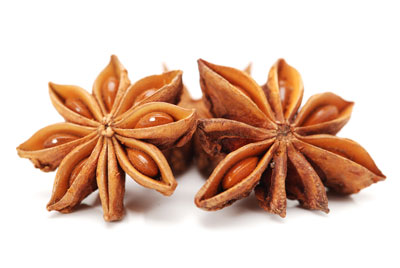
| HOME | MENU | DOCS | SEARCH |
Star anise, or badian, is a unique plant that is widely used in cooking, medicine, and perfumery. It is an evergreen tree 8 -10 meters tall, with beautiful light yellow flowers and dark red or brown fruits in the form of an asterisk.
Information about anise is in the Bible and the papyrus of Egypt, about 1500g. BC. It was known both to India and in China, and in Greece and in ancient Rome.
The first to learn about star anise before the era of the Chinese. An aromatic essential oil was made from it, the ground grain of an aniseen was added to beverages such as tea and coffee. In Europe, the plant came at the beginning of the XVI century. Star anise was widely used in cooking. Merchants delivered it to Russia, however, not everyone could afford it, since it was sold at astronomical prices. Usually its seeds were used in baking gingerbread, pretzels and gingerbread. In our time, star anise goes to the essential oil, the use of which seriously extends the benefits of the plant.
Essential oil of anise is obtained from anise of an ordinary - annual herbaceous plant, having a scent, which is due to its presence. Organic acid, fatty oil, sugar, protein substances are present in the dry seeds of anise ordinary. The composition of the essential oil consists mainly of two compounds: methylchavicol and anethole, and also contains a-pinene, a-phellandrene, camphene, dipentene, anisketone and acetaldehyde. In order to get 1 kg of essential oil of anise ordinary, it takes 40 - 50 kg of mature seeds of anise, which are processed for this by the method of hydrodistillation. Ripe seeds are first crushed, and then subjected to distillation.
Anise essential oil is a light yellow liquid. When cooled, the oil solidifies and turns into a white crystalline substance. To keep the oil warm, you only need to hold it in your hand for a few minutes. Anise oil has a characteristic and strongly pronounced smell. It dissolves well in alcohol and is very bad in water.
The main component that is part of anise oil is anethole. Its content is up to 90%. The next most important component is methylchavicol. Its content is up to 10%. All the rest is anisic acid, propionic acid, camphene, dipentene, a-phellandrene and several other substances.

Essential oil of anise ordinary has analgesic, antiseptic, anti-toxic, carminative, antipyretic, diuretic, expectorant, anti-inflammatory, sedative, soothing effect.
It is used to treat asthma, aerophagia, bronchitis, hypogalactia, migraine, burns, oliguria, hay fever, sinusitis, angina pectoris, scurvy. It also helps with liver and kidney diseases, fainting, headaches, dizziness, some skin diseases and diseases of the uterus, helps get rid of excessive sweating.
Reduces the excitability of the cardiovascular system, so you can use as a means of normalizing high blood pressure, as well as a sedative after stress, nervous overstrain or a strong emotional experience. Also reduces shortness of breath in heart patients and contributes to the treatment of tachycardia.
It helps to improve the work of the genitals and solve problems in the sexual sphere - it is a sexual stimulant, therefore it is recommended to be used in the treatment of impotence and frigidity. It helps with bronchial and dry cough (helps to remove sputum and mucus), colds and stagnation associated with it. In general, anise essential oil has a very positive effect on respiratory and lung diseases.
It improves the gastrointestinal tract, helps to get rid of flatulence, intestinal colic, improves digestion and increases appetite, eliminates spastic pains in the abdomen, strengthens the secretory and motor function of the digestive apparatus, strengthens the stomach, restores perestaltik.
Of particular note is the healing properties of aniseed essential oil in the field of maternity. It is recommended to apply in case of a lack of milk in a nursing mother. It increases its excretion (lactation). The anis ordinary has not smaller medical effect at treatment of the diseases connected with disturbance of a nervous system. This essential oil contributes to its toning, improving sleep and getting rid of insomnia, has a sedative effect with excessive nervous excitability.
Anise oil is recommended for painful menstruation to eliminate unpleasant symptoms, as well as to normalize the monthly cycle. It is also an excellent healing tool for people suffering from dropsy, for those who wish to restore a healthy skin condition (to achieve elasticity and get rid of its flabbiness).
In some cases, anise essential oil is used for insect bites. In addition, anise essential oil enhances the effect of antibacterial drugs.
Useful and healing properties of anise oil
Anise oil has a wide range of effects, both prophylactic and therapeutic:
• Catarrhal respiratory diseases. Anise oil has a softening and expectorant effect and at the same time it has antipyretic properties. Increases the secretion of the bronchial mucosa. Agents based on anise oil may be prescribed in the treatment of bronchopneumonia, bronchitis, laryngitis, tracheitis;
• Normalization of the functioning of the digestive tract. It has a positive effect on flatulence, colic and dyspepsia. Stimulates intestinal motility. Suppresses nausea caused by nerves;
• Anise oil has anti-inflammatory effects on the urinary system;
• Oil can be used in the presence of sexual problems. Since the days of ancient Rome, it is considered an aphrodisiac;
• Positively affects the emotional background of a person. The use of anise oil is indicated for chronic fatigue syndrome, depressive and stressful conditions.
Anise oil is well known to fishing enthusiasts, who use it as one of the components of the bait for fish.
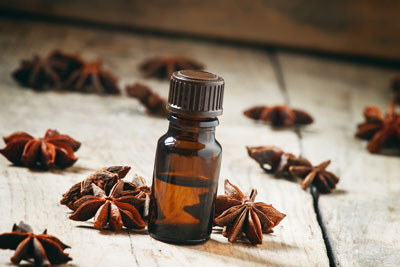
Anise essential oil for the face - recipes and application
Anise essential oil is considered one of the most successful options for the care of dull, loose and fading skin. The cause of the loss of skin elasticity is a violation of the water-fat balance. A regular use of anise oil puts this balance in order. The skin, thanks to this oil, increases its elasticity, tone and elasticity.
To follow the skin of the face, you can use the following recipes:
• Take lotion, tonic, milk or cream. Add 3 drops of anise oil to 10 ml of base. The resulting mixture can be applied to the face, as a night cream or as a mask;
• Take 1 tablespoon of carrot juice and sour cream. Add 1 egg yolk and 3 drops of aniseed oil. Mix everything well. Apply this mask on your face and leave it there for about 20 minutes. Then rinse with warm water. Do this 2 times a week. In just a month you will see how your skin condition has changed - it became smooth and acquired a healthy color.
Do not apply anise oil on the skin in its pure form. Also, the use of anise oil is contraindicated in the presence of any inflammation on the skin. Otherwise, dermatitis may occur.
Anise essential oil for hair - recipes and application
Anise oil also has a positive effect on the hair, helping to strengthen and release it from dandruff. Hair begins to grow better, and become much more beautiful. Here are a couple of recipes that are well suited for hair care:
• Mix 2 drops of aniseed oil with 2 spoons of burdock oil. The resulting mixture is now heated and rubbed into the scalp. Then wrap your head with a towel and wait 40 minutes. Then wash your hair;
• Take 1 tsp of jojoba oil and coconut oil. Add one drop of anise oil and fir oil. Now mix it all well. Apply the mixture evenly onto hair and scalp and leave overnight. Keep in mind - this mask should be done 1 time per week, not more often.
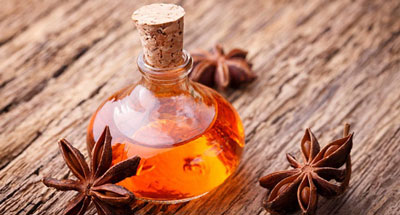
Anise oil is a phytopreparation that has expectorant, bronchodilator, antimicrobial, as well as a slight analgesic effect. It is used in pulmonology with a history of colds, as well as in neurological practice and in gastroenterology.
• Pharmachologic effect
Anise oil instructions for use refers to drugs that have an expectorant and anti-inflammatory effect on the body. In addition, this herbal remedy has a laxative effect and antispasmodic effects.
It can enhance the process of phagocytosis, it affects the improvement of tissue respiration, besides it activates the motor function of the ciliated epithelium, improves the discharge of bronchial secretions. The oil has a bactericidal effect on some types of microorganisms, that is, it leads to the death of pathogenic bacteria. In addition, it has a deodorizing property, due to the fact that it has the presence of esters.
It is obtained from the crushed fruits of this representative flora. Apply it in the presence of intestinal colic, it can affect the relief of rheumatic and menstrual pain, as well as relieves muscle spasms.
• Indications for use of anise oil
Drugs that contain this oil are recommended for use in the following conditions:
• Some inflammatory diseases of the respiratory tract in history, which are accompanied by symptoms such as coughing, and the separation of sputum is difficult;
• Apply drugs and in violation of the gastric, secretion, as well as spasms of the hollow organ;
• Effective drugs in the presence of flatulence;
• Apply them with sexual impotence;
• With painful menstruation;
• And also the drugs are effective for sleep disorders;
• In home cosmetology it is used to care for thin aging and dry skin.
Often drugs based on anise oil are included in the combined treatment of diseases of the respiratory tract, of course, it is first recommended to consult with a physician pulmonologist or with a general practitioner.
• Application and dosage of anise oil
Doses will depend on the dosage form used. Immediately before its use, it is recommended to consult with a specialist.
For example, for the treatment of cough is recommended to carry out medicinal inhalation. To do this, in a special inhaler or in a small container with warm water, it is recommended to add a drop of this component. Then you can breathe over the steam for five or seven minutes. This is what concerns hot inhalations.
It is also possible to carry out cold inhalations. To do this, it will be needed in the amount of two drops, which are recommended to be dripped onto a regular napkin, or into a special aroma pendant. After which the procedure should last no more than fifteen minutes.
You can apply this oil to skin care, for this you can prepare such a cream. You will need about 50 milliliters of a creamy base, where you should pour three drops of oil, after which the components are mixed and put the finished substance on the skin. To improve sleep, it is recommended to use the aroma lamp, where you should drip it at least three drops.
Aroma lamps - 4-6 drops; for hot inhalations 1 - 2 drops, session duration 5 - 7 minutes, add 4 - 7 drops to the baths; for massage - connect 6 drops of anise ordinary oil with 10 milliliters of vegetable oil. Also, do cold compresses on the calf muscles with a cold - 7 drops; use in the form of warm compresses on the lumbar region, abdomen, chest - 7 drops; For internal use: 1 drop with jam or honey 1 - 3 times a day.
• Preparations containing Anise oil
- Karmolis is a gel for local use, it is produced in tubes, and also produced in the form of drops and in lotion.
- There are ammonia and anisic drops, they are presented in an alcohol solution, which is placed in vials. - Chest elixir.
- Dry cough syrup for adults and for children, it is produced in powder for the preparation of a medicinal solution.
- Dr. Theiss bronchosept is available in drops for oral administration, a special dropper cap is included with the kit.
- BronhoSan, it is presented in the dosage form in the form of drops, intended for internal use, produced in bottles.
- Dr. Theiss Aniseed Oil - This drug is available in capsules.
It is worth noting that Anise oil, as an additional component, is often included in the combination medicines that have mucolytic and expectorant effects.
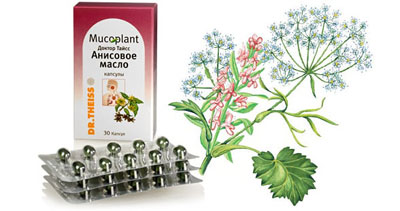
Anise oil is contraindicated in children (up to 3 years inclusive), pregnant women and allergies. Can not be used for internal use with high acidity and gastric ulcer. In all other cases, you need to conduct a test for individual intolerance. When using anise oil, you must strictly follow the dosage.
May cause an allergic skin, respiratory or digestive tract reaction. An overdose of aniseed essential oil leads to dizziness and nausea - whether it is ingestion, bathing or massage. With prolonged intake of oil and high doses of essential oil of anise can cause slower blood circulation, brain flushes, muscle spasms, have a weak narcotic effect.
Before proceeding to the use of the above preparations, which include Anise oil, it is recommended to consult with a specialist. It is worth remembering that sometimes allergic reactions can occur, while at the same time the use of such drugs should be temporarily abandoned and consult a doctor.
See Anise
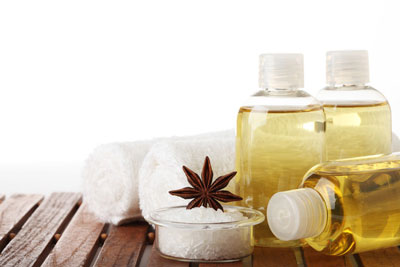
When creating this article was used material
from the following sources.
To the list of oilseeds of plant origin
We recommend that you look at the popular sections of the site myvaleology.com: MENU with a description of the sections | |||
| SOCIAL | DONATION | MY DIET | MY SPORT |
|
|
Release all4e8 |
||
Copyright © VZOJ 2023. All rights reserved. When reprinting or quoting myvaleology.com materials please put a link to the site myvaleology.com :
<a href="https://myvaleology.com">Healthy lifestyle</a>